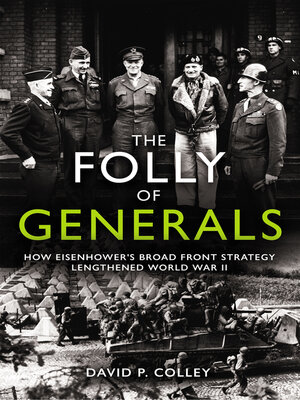The Folly of Generals
ebook ∣ How Eisenhower's Broad Front Strategy Lengthened World War II
By David P. Colley

Sign up to save your library
With an OverDrive account, you can save your favorite libraries for at-a-glance information about availability. Find out more about OverDrive accounts.
Find this title in Libby, the library reading app by OverDrive.



Search for a digital library with this title
Title found at these libraries:
| Library Name | Distance |
|---|---|
| Loading... |
The author of The Road to Victory delivers "a well-written, easy to read, and concise summary of the options available to Eisenhower and the Allies" (Journal of Military History).
Imagine how many lives would have been saved had the war in Europe finished in December 1944 instead of five months later . . . David Colley analyzes critical mistakes made by the Allied supreme commander, General Dwight Eisenhower, in the last nine months of the war. He argues that had Eisenhower been more adept at taking advantage of several potential breakthroughs in the Siegfried Line in the fall of 1944 the war in the European Theater of Operations might have ended sooner.
The book details the American penetration of the Siegfried Line in mid-September and their advance into Germany at Wallendorf before the troops were called back. It also examines in detail operations in the Stolberg Corridor and the actions of General Lucian Truscott. It compares the battles at Wallendorf and Stolberg with Operation Market Garden, and assesses the effectiveness of these operations and the use of the troops. Eisenhower later called off another operation in November 1944, already in progress, to cross the Rhine and destroy the German 1st Army north of Strasbourg. American and German generals believe this operation would have shortened the war.
The Folly of Generals explores these potential breakthroughs—along with other strategic and tactical mistakes in the ETO and in Italy, some never before revealed—that might have shortened the war by a considerable margin.
"Throughout the book, Colley uses postwar comments by German generals to support his arguments." —New York Journal of Books
Imagine how many lives would have been saved had the war in Europe finished in December 1944 instead of five months later . . . David Colley analyzes critical mistakes made by the Allied supreme commander, General Dwight Eisenhower, in the last nine months of the war. He argues that had Eisenhower been more adept at taking advantage of several potential breakthroughs in the Siegfried Line in the fall of 1944 the war in the European Theater of Operations might have ended sooner.
The book details the American penetration of the Siegfried Line in mid-September and their advance into Germany at Wallendorf before the troops were called back. It also examines in detail operations in the Stolberg Corridor and the actions of General Lucian Truscott. It compares the battles at Wallendorf and Stolberg with Operation Market Garden, and assesses the effectiveness of these operations and the use of the troops. Eisenhower later called off another operation in November 1944, already in progress, to cross the Rhine and destroy the German 1st Army north of Strasbourg. American and German generals believe this operation would have shortened the war.
The Folly of Generals explores these potential breakthroughs—along with other strategic and tactical mistakes in the ETO and in Italy, some never before revealed—that might have shortened the war by a considerable margin.
"Throughout the book, Colley uses postwar comments by German generals to support his arguments." —New York Journal of Books







